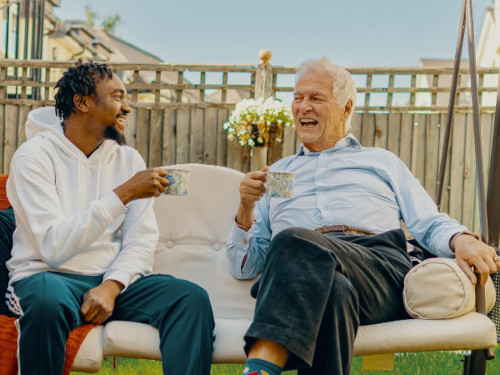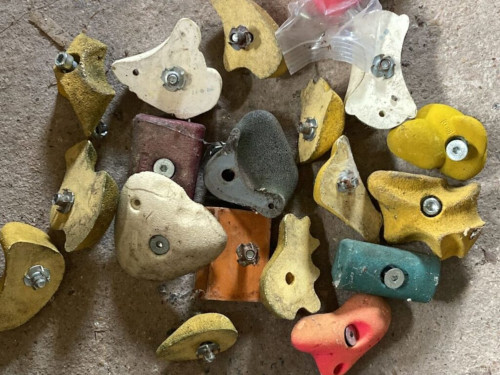We’ve put out requests for help before – in blog articles, at public events and via word of mouth. And they worked. In Stroud, we now have a core group of 10 people and three sector groups – housing commons, land common and leisure commons, with 8-10 people each. We have a first property that we’re bringing into the commons, we have a team of volunteers working on the ‘user experience’ of the website, and we have budding groups in 20 other towns in the UK, and in 3 other countries.
But what we’ve been asking people to do so far hasn’t been simple – it’s involved giving some time and energy to attending meetings, organising events, building a website etc. To become ‘commoners’ in other words. In this article, we’re asking you to do a couple of things that are much easier – but they’d be very useful to us. The first is to be interviewed about the website and the concept of commoning, and the second is to complete a quick survey about the possibility of a ‘climbing commons’ – a community-owned climbing centre. See below for more information on these two asks. But first …
Why help the commons?
Let’s talk more about why you might want to support the commons movement. We’ve previously explained the nuts and bolts of how it works. Here, want to explain the spirit of commoning.
If you’re reading this, you’ll know, at least vaguely, about the commons. I think everyone has a sort of gut reaction when they hear the word ‘commons’. In our experience, most people react well to it, even if they don’t really know what it is. They assume community, trust, self-provisioning, looking after each other, making it more difficult for corporations to suck wealth out of communities etc.

However, we’ve also had a few negative responses (although a very small percentage). We’ve been asked if it’s a form of communism, and some people have heard the phrase ‘tragedy of the commons’ (which wasn’t about the commons – we’ll blog more about this soon), and some people have said that control should be in the hands of the state, not communities. But I think most people instinctively feel that more community ownership and control of resources is a good thing.
That’s what the commons economy is about – providing for ourselves, investing in our communities without banks or the financial sector, to provide community resilience in case of hard times. But really, we’re thinking in terms of a different way of living. The most important aspect of the commons is the social relations – the way people interact with each other.
The roots of the commons approach lie in thinking about what’s best for us as communities rather than what’s best for us as individuals. Because the individual approach has been dominant for so long, it’s easy to see the community approach as naive or unrealistic – but that’s forgetting that the community approach has been dominant for the vast majority of humanity, for most of human history. In fact we think that the current problems we face are down to the systemic changes that took place in our history that gave dominance to the individualistic approach.
We believe that as commons initiatives take root at the heart of communities, commoners will make sure that no fellow commoners are ever homeless, hungry or alone. Everyone needs shelter, food and social contact. Those are basic needs – and I think that the number one priority is to make sure that commoners have those things. We’re doing that by trying to build the commons economy, but I think there’s a more immediate, fundamental social level to it as well – i.e. we just look after each other. People instinctively want to help others (think about the public’s response to emergency campaigns after a famine, war or natural disaster), but often they don’t have the money or time to do it.

A commons economy can bring local jobs, affordable utilities, secure housing etc. as well as innovative ways of providing for ourselves and looking after each other. For example, if you’re an older person, you could leave your home to the commons, but continue to live in it until you die. Commoners will make sure your home is maintained and insulated properly, and will look after you – pop in for a chat, do your shopping, look after your garden (including growing fruit and veg), and make sure you’ve got everything you need.
So if you’d like to see this happen soon, here are two simple ways you can help us right now.
Interviews
We want to work out how to tell the story of the commons, and how the commons can improve people’s lives, communities and the world. So we’d like to know what you think about the website and the information we’re putting out. Does it make sense? What can we do better?
Can one of our team contact you to ask you a few questions? Contact us if you’d be happy to be interviewed.
Here are a few examples of the kinds of questions you might be asked (we haven’t worked out the exact questions yet):
- What does the word ‘commons’ mean to you, and what attracted you to it?
- What information did you find useful in understanding about commons?
- What wasn’t very clear? or difficult to understand?
- What would it take for you to become an investor, volunteer or customer/tenant etc?
- Anything else you’d like to suggest?
We’ll use the responses to make changes to the website and the information we provide, to make them more accessible to a wider audience.
The interviews can be with anyone, anywhere, so do pass this on to friends you think might be interested.
Survey
This one is just for people in or around Stroud – anyone who might visit a commons / community-owned climbing gym in Stroud, once it’s up and running. (if it works, we’ll be helping others do the same elsewhere).

Here’s a message from the climbing group:
“Hi there! Climbing Commons is currently working on a project to build climbing facilities in Stroud, and we could really use your help. Could you take a moment to fill out and share our survey with your friends and contacts? We’re aiming to gather insights from as many people as possible, from children to grandparents.
Here’s the survey link
Feel free to spread the word however you like! Every response makes a big difference in whether we can make this happen.
Thanks a bunch for your support!”
Of course, you can still help in ‘harder’ ways – contact us if you think you’d like to volunteer, join a group or invest in housing, land or leisure commons.















